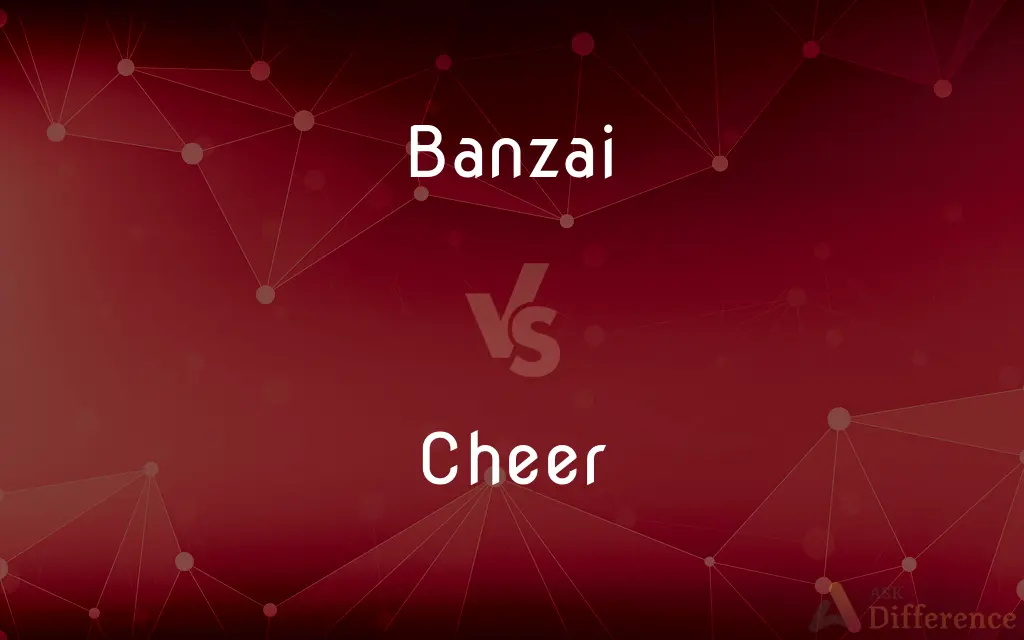Banzai vs. Cheer — What's the Difference?
By Urooj Arif & Maham Liaqat — Updated on March 30, 2024
Banzai is a Japanese exclamation meaning a wish for long life, often associated with enthusiasm and triumph, whereas cheer is a broader term for expressions of support or happiness in various forms and languages.

Difference Between Banzai and Cheer
Table of Contents
ADVERTISEMENT
Key Differences
Banzai, originating from Japanese culture, is a traditional exclamation used to express a wish for long life and happiness, especially in celebrations or to honor someone. It's deeply rooted in Japanese history and carries a sense of unity and fervor. On the other hand, cheer refers to expressions of support, encouragement, or happiness, commonly used in Western cultures. It can be verbal, like shouting "Hooray," or physical, such as clapping or waving.
While banzai is specifically used in contexts of celebration or honor, often in groups, cheer is a versatile term that encompasses various forms of showing approval or encouragement. Cheer can be used in sports events, casual gatherings, or to simply uplift someone's spirit.
Banzai traditionally involves the act of raising both arms while shouting "Banzai!" three times, symbolizing a strong, unified wish for long life or victory. Whereas, cheer might not have a specific gesture or form and can vary greatly from one context to another, including cheers at sports events, applause, or even a comforting word.
Banzai is most commonly heard in Japan and in contexts related to Japanese culture or events. It has a distinct cultural significance and is not commonly used outside these contexts. On the other hand, cheer is a widely used term in English-speaking countries and beyond, with no specific cultural connotation, making it a universal expression of positive sentiment.
The concept of banzai is closely linked to historical and cultural traditions in Japan, reflecting its usage in significant events, such as New Year's celebrations or after a victorious effort in competitions. Cheer, however, is a more casual and everyday term, used across various situations from sports games to personal achievements, reflecting its broader application and understanding.
ADVERTISEMENT
Comparison Chart
Origin
Japanese
English
Meaning
A wish for long life
Expressions of support or happiness
Context
Celebrations, honor
Broad, including sports, personal encouragement
Physical Gesture
Raising both arms and shouting "Banzai!"
Varies, can include clapping, shouting, waving
Cultural Significance
Deeply rooted in Japanese traditions
Used widely, with no specific cultural connotation
Compare with Definitions
Banzai
Represents unity and fervor in Japanese culture.
The soldiers shouted Banzai! as a symbol of their unwavering unity and spirit.
Cheer
Can be verbal, physical, or both, adapting to various contexts.
She sent a cheer through a supportive text message to her friend.
Banzai
A Japanese exclamation wishing long life and happiness.
At the emperor's parade, the crowd shouted Banzai! to express their respect and wishes for his long reign.
Cheer
Reflects positive sentiments like approval, encouragement, or joy.
Their cheers at the end of the performance were loud and heartfelt.
Banzai
Primarily used within Japanese culture and events.
At the traditional Japanese festival, participants shouted Banzai! to celebrate their cultural heritage.
Cheer
An expression of support, encouragement, or happiness.
The crowd's cheer uplifted the athlete's spirits during the competition.
Banzai
Often used in group celebrations to wish for collective happiness or success.
After the team's victory, the fans raised their hands and shouted Banzai! in unison.
Cheer
A universally understood concept, not tied to a specific culture.
Despite the language barrier, the visiting team understood the local crowd's cheers as a sign of support.
Banzai
Has historical significance in Japan, related to imperial and military celebrations.
During historical celebrations, Banzai! was shouted to honor the emperor and the nation.
Cheer
Used in a wide range of situations, from sports to personal achievements.
His friends gathered to cheer him on during the final match.
Banzai
A Japanese battle cry or patriotic cheer.
Cheer
Shout for joy or in praise or encouragement
She cheered from the sidelines
Banzai
Thrill-seeking; wild.
Cheer
Give comfort or support to
He seemed greatly cheered by my arrival
Banzai
A cry or cheer of enthusiasm, or to celebrate victory.
Cheer
A shout of encouragement, praise, or joy
A tremendous cheer from the audience
Banzai
A cry or cheer of "banzai", to express enthusiasm or celebrate victory.
Cheer
Cheerfulness, optimism, or confidence
An attempt to inject a little cheer into this gloomy season
Banzai
Clipping of banzai charge
Cheer
A shout of approval, encouragement, or congratulation
A remark that drew cheers from the crowd.
Banzai
Lit., May you live ten thousand years; - used in salutation of the emperor and as a battle cry.
Cheer
A short, rehearsed jingle or phrase, shouted in unison by a squad of cheerleaders.
Banzai
A Japanese cheer of enthusiasm or triumph
Cheer
Comfort or encouragement
A message of cheer.
Cheer
Lightness of spirits or mood; gaiety or joy
A happy tune, full of cheer.
Cheer
Festive food and drink; refreshment
Did not refrain from sampling their holiday cheer.
Cheer
To shout cheers.
Cheer
To express praise or approval
Bloggers cheered when the favorable decision was announced.
Cheer
To become cheerful
Had lunch and soon cheered up.
Cheer
To encourage with cheers
The fans cheered the runners on.
Cheer
To salute or acclaim with cheers; applaud.
Cheer
To express praise or approval for; acclaim
Cheered the results of the election.
Cheer
To make happier or more cheerful
A warm fire that cheered us.
Cheer
(uncountable) A cheerful attitude; happiness; a good, happy, or positive mood.
Cheer
That which promotes good spirits or cheerfulness, especially food and entertainment prepared for a festive occasion.
A table loaded with good cheer
Cheer
(countable) A cry expressing joy, approval or support, such as "hurrah".
Three cheers for the birthday boy!
A cheer rose from the crowd.
Cheer
(countable) A chant made in support of a team at a sports event.
Cheer
(obsolete) One's facial expression or countenance.
Cheer
(archaic) One's attitude, mood.
Cheer
Cheerleading, especially when practiced as a competitive sport.
Alex participated in cheer all four years of college.
I'm going to wear my new cheer shoes at cheer today.
Cheer
(transitive) To gladden; to make cheerful; often with up.
We were cheered by the offer of a cup of tea.
Cheer
(transitive) To infuse life, courage, animation, or hope, into; to inspirit; to solace or comfort.
Cheer
To encourage to do something.
Cheer
(ambitransitive) To applaud or encourage with cheers or shouts.
The crowd cheered in support of the athletes.
The crowd cheered the athletes.
Cheer
To feel or express enthusiasm for (something).
The finance sector will cheer this decision.
Cheer
The face; the countenance or its expression.
Cheer
That which promotes good spirits or cheerfulness; provisions prepared for a feast; entertainment; as, a table loaded with good cheer.
Cheer
Feeling; spirit; state of mind or heart.
Be of good cheer.
The parents . . . fled away with heavy cheer.
Cheer
Gayety; mirth; cheerfulness; animation.
I have not that alacrity of spirit,Nor cheer of mind, that I was wont to have.
Cheer
A shout, hurrah, or acclamation, expressing joy enthusiasm, applause, favor, etc.
Welcome her, thundering cheer of the street.
Cheer
To cause to rejoice; to gladden; to make cheerful; - often with up.
Cheer
To infuse life, courage, animation, or hope, into; to inspirit; to solace or comfort.
The proud he tamed, the penitent he cheered.
Cheer
To salute or applaud with cheers; to urge on by cheers; as, to cheer hounds in a chase.
Cheer
To grow cheerful; to become gladsome or joyous; - usually with up.
At sight of thee my gloomy soul cheers up.
Cheer
To be in any state or temper of mind.
How cheer'st thou, Jessica?
Cheer
To utter a shout or shouts of applause, triumph, etc.
And even the ranks of TusculumCould scare forbear to cheer.
Cheer
A cry or shout of approval
Cheer
The quality of being cheerful and dispelling gloom;
Flowers added a note of cheerfulness to the drab room
Cheer
Give encouragement to
Cheer
Show approval or good wishes by shouting;
Everybody cheered the birthday boy
Cheer
Cause (somebody) to feel happier or more cheerful;
She tried to cheer up the disappointed child when he failed to win the spelling bee
Cheer
Become cheerful
Cheer
Urge on or encourage especially by shouts;
The crowd cheered the demonstrating strikers
Common Curiosities
What is the main difference between banzai and cheer?
Banzai is a Japanese exclamation specifically wishing long life, mainly used in celebrations, whereas cheer is a broader term for expressing support or happiness.
Is cheering always loud?
Not necessarily; cheering can be loud or quiet, like applause or a supportive whisper, depending on the context.
Can "banzai" be used as a cheer?
Yes, "banzai" can be considered a form of cheer within Japanese cultural contexts, expressing collective well-wishes or celebration.
Are there specific occasions where "banzai" is preferred over "cheer"?
Yes, "banzai" is particularly suited to Japanese celebrations, cultural events, or to honor someone, reflecting its cultural specificity.
Do you have to be Japanese to use "banzai"?
While anyone can use "banzai," it's deeply rooted in Japanese culture and typically used in contexts related to Japan or Japanese traditions.
Is "cheer" used internationally?
Yes, "cheer" is widely understood and used in various forms around the world, transcending cultural and linguistic barriers.
How do gestures associated with "cheer" vary?
Gestures for "cheer" can vary greatly, from the specific raising of arms in "banzai" to clapping, shouting, or other forms of expression in different cultures.
What makes "banzai" unique in its cultural context?
"Banzai" carries historical and cultural significance in Japan, symbolizing unity, respect, and well-wishes in a way that is unique to Japanese traditions.
Is "banzai" associated with any specific gestures?
Yes, shouting "banzai" typically involves raising both arms in the air, which is a gesture associated with this exclamation.
How do cultural perceptions of "banzai" and "cheer" differ?
Cultural perceptions of "banzai" are closely tied to Japanese tradition and respect, while "cheer" is seen as a more universal expression of positivity and support.
Can "cheer" refer to a physical gesture?
Yes, "cheer" can involve physical gestures like clapping, waving, or other actions that express support or happiness.
How does the concept of "cheer" impact team morale in sports?
Cheers from fans and teammates can significantly boost team morale, providing motivation and support during competitions.
Can "banzai" be used in a casual context?
While it can be used casually, "banzai" often carries a formal or celebratory tone due to its cultural and historical connotations.
Is there a specific way to express "cheer" in sports?
In sports, "cheer" can take many forms, including cheering squads, fan chants, and applause, tailored to the event and team traditions.
Does "cheer" have different meanings in different contexts?
Yes, "cheer" can signify support, encouragement, celebration, or happiness, with its meaning subtly changing based on the context.
Share Your Discovery

Previous Comparison
Artisan vs. Technician
Next Comparison
Glassware vs. CrockeryAuthor Spotlight
Written by
Urooj ArifUrooj is a skilled content writer at Ask Difference, known for her exceptional ability to simplify complex topics into engaging and informative content. With a passion for research and a flair for clear, concise writing, she consistently delivers articles that resonate with our diverse audience.
Co-written by
Maham Liaqat














































